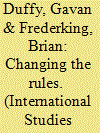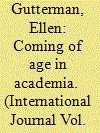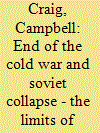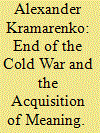|
|
|
Sort Order |
|
|
|
Items / Page
|
|
|
|
|
|
|
| Srl | Item |
| 1 |
ID:
188621


|
|
|
|
|
| Summary/Abstract |
This analysis revisits Britain’s reorientation towards Europe following its European Community [EC] membership during the 1970s and 1980s. Looking at British policy towards China, the United States, and key EC member-states, Britain tried to pursue its national interests from a distinctively European platform, and played an important part in the emergence of a coherent Western European voice on the international stage at the time. Yet the lack of an overarching European strategy, the ignorance of spill-over factors between different foreign policy areas, and the personal temperaments of Britain’s political leaders all meant that the European turn in British foreign policy was rarely visible to contemporaries and ultimately remained incomplete at best.
|
|
|
|
|
|
|
|
|
|
|
|
|
|
|
|
| 2 |
ID:
089036


|
|
|
|
|
| Publication |
2009.
|
| Summary/Abstract |
Constructivists often refer to the end of the Cold War to illustrate their contention that social rules are not immutable. Agents can change the rules by performing actions that undermine them. In this article, we describe the Cold War as a set of social rules sustained by superpower speech acts. We show that, by altering their behavior, the superpowers undermined the felicity of these rules. In so doing, they progressively dismantled the rules of the Cold War. Our model captures the competing arguments in the ongoing debate about whether the rationalist buildup argument or the constructivist new thinking argument better explains the end of the Cold War. Within the model, we identify the rules that, when made infelicitous by the superpowers, resolves tensions in the Cold War rule system in ways consistent with each argument. We conclude by showing how these competing arguments are reflected in contemporary debates concerning the nature of the global security rules emerging in the post-cold-war world.
|
|
|
|
|
|
|
|
|
|
|
|
|
|
|
|
| 3 |
ID:
154635


|
|
|
|
|
| Summary/Abstract |
Taking the view of International Relations (IR) as a socio-intellectual space conditioned by historical circumstances, and drawing on my personal reflections on international politics in the 1990s as a particularly important influence on my own professional and intellectual path in IR, this paper explores the 1990s as an exceptional period that shaped the decline of Canadian Foreign Policy as a field of study in Canadian IR. Bookended by the collapse of the Soviet Union and the end of the Cold War, at the beginning, and the start of the War on Terror at its finale, the 1990s can be read as an “optimistic interregnum” during which new possibilities arose for an inclusive, global transnationalism and the global governance of important problems. New ideas and new ways of conceptualizing IR through a global lens emerged. For Canadian students of IR in the 1990s, outward-looking globalism, transnationalism, cosmopolitanism, and theoretical eclecticism fit with the hopeful optimism of the times. In contrast, CFP—with its attendant requisite of policy relevance in service of Canadian national priorities—seemed inward-looking, parochial, and on the sidelines of important new intellectual currents and analyses.
|
|
|
|
|
|
|
|
|
|
|
|
|
|
|
|
| 4 |
ID:
145228


|
|
|
|
|
| Summary/Abstract |
Did the United States promise the Soviet Union during the 1990 negotiations on German reunification that NATO would not expand into Eastern Europe? Since the end of the Cold War, an array of Soviet/Russian policymakers have charged that NATO expansion violates a U.S. pledge advanced in 1990; in contrast, Western scholars and political leaders dispute that the United States made any such commitment. Recently declassified U.S. government documents provide evidence supporting the Soviet/Russian position. Although no non-expansion pledge was ever codified, U.S. policymakers presented their Soviet counterparts with implicit and informal assurances in 1990 strongly suggesting that NATO would not expand in post–Cold War Europe if the Soviet Union consented to German reunification. The documents also show, however, that the United States used the reunification negotiations to exploit Soviet weaknesses by depicting a mutually acceptable post–Cold War security environment, while actually seeking a system dominated by the United States and opening the door to NATO's eastward expansion. The results of this analysis carry implications for international relations theory, diplomatic history, and current U.S.-Russian relations.
|
|
|
|
|
|
|
|
|
|
|
|
|
|
|
|
| 5 |
ID:
113620


|
|
|
|
|
| Publication |
2012.
|
| Summary/Abstract |
William Wohlforth and Daniel Deudney and John Ikenberry provide strong Realist and Liberal analyses, respectively, of the End of the Cold War. Both interpretations, however, beg larger conceptual and historical questions, which cannot be answered without making the nuclear revolution central to explaining Soviet collapse.
|
|
|
|
|
|
|
|
|
|
|
|
|
|
|
|
| 6 |
ID:
087872


|
|
|
|
|
| Publication |
2009.
|
| Summary/Abstract |
The end of the Cold War caught many people by surprise on both sides of the infamous Iron Curtain. It bred a euphoria that was not a substitute for sober analysis, which simply seemed to be uncalled for at the time. The awareness came much later that the world had entered an unprecedented transitional period in its development that would obviously result in an intellectual challenge. These moods were summarized in a call to formulate a shared vision of the new historical era. The crisis of U.S. foreign policy, boldly manifested in "war of choice" in Iraq, sent a signal of alarm. It seemed that a country that had emerged victorious from the Cold War should not undergo this crisis. Yet we are now seeing a global financial and economic crisis rooted in the ideologies and practices of how the U.S. financial sector functioned over the past two decades. It shows convincingly that one-sided solutions and actions cannot bring any of the so-called public goods to the international community. On the contrary, solutions are not being found to existing problems and new ones are springing up.
Presumably, the riddle of the current stage of global development cannot be solved unless one gleans the meaning of what happened at the end of the 1980s and the beginning of the 1990s. It would not be an overstatement to claim in this connection that the problem of what the future has in store for the U.S. - which has become the facade of the historical West - will be of key significance.
|
|
|
|
|
|
|
|
|
|
|
|
|
|
|
|
|
|
|
|
|